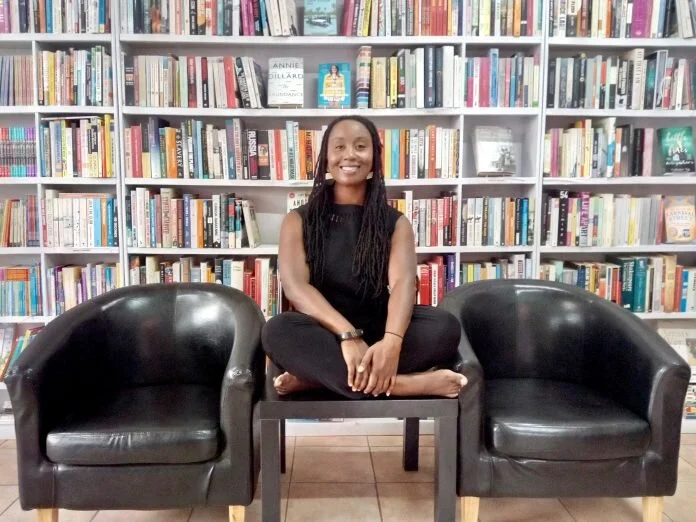Global Impact
One of the best things that happened when I opened my personal library to the public in Accra, Ghana, in December 2017, was also one of the first. It was on my second day when a small, shy teenager cautiously stepped through the door and into the middle of the space where she stood, transfixed, surrounded by books. “If I hadn’t brought her here today, she would’ve killed me,” her mum said, with a completely straight face. The girl remained stuck in her spot, her mouth slightly agape, oblivious to her mother’s obvious frustration. Recognizing her daughter’s state of suspension, the older woman resigned herself to her fate and took up residence in one of the tub chairs. “She’s so excited,” she said, gazing at her child. Pride had replaced annoyance.
When I told the girl she could borrow two books, her eyes glistened, as if tears werethreatening to form, and she immediately reached for Women, Race, and Class by Angela Davis and Chimamanda Ngozi Adichie’s We Should All Be Feminists. I was so impressed by her choices that I insisted she take another. She was torn. She searched through the shelves, and eventually settled on two, flitting between Margot Lee Shetterley’s, Hidden Figures and The Autobiography of Malcolm X. She opted for the latter. I was now the one in awe. Behind the reserved exterior and deferential demeanor was a steely young woman who wanted to change the world. At that moment, I felt there was nothing left for me to do. My work was complete.
When I left Hedgebrook in the spring of 2017, I had no idea I’d venture from the Pacific Northwest to the Gulf of Guinea and achieve a long-held dream. This cross-continental journey can, in part, be traced back to conversations I had around the fabled farmhouse kitchen table with fellow resident, Saskia, a German-Indian novelist who lived between the Two countries of her heritage. As someone who’s never been at ease in groups, I latched onto Saskia soon after I arrived and we talked for hours about the places we’d lived. I confided in her that I was thinking of leaving London, my hometown, for somewhere more livable, and she encouraged me to see Ghana, my parents’ homeland, as a viable option.
One of the things that made moving to Ghana easier was that the vast majority of my beloved book collection, over a thousand volumes gathered over 20 years, were already there. Since 2011, I’d routinely ship them to my mother’s house in Kumasi when I could no longer accommodate them in my London studio. Each time I’d visit, I’d feel an overwhelming sense of guilt that the books, primarily by writers of color, were just sitting there and not being read when there was a need for access to culturally-relevant, contemporary literature. The idea behind the library was twofold: to give Ghanaians access to books that weren’t easily obtainable and to amplify the voices of Black writers on the continent.
In the 18 months since the library opened, its objective has evolved. My focus now is as much on literacy as literature, and outreach to underserved communities is a core part of my work. In Ghana, illiteracy is high (30%), particularly among women and girls.
During my time here, I’ve met some amazing women who are doing all they can, often at tremendous personal sacrifice, to improve the life chances of girls. Auntie Grace, a former teacher, who founded Gem Star School in the compound of her small home, is one such example. I donated about 300 books to the school and we worked together to create a library for its 500 pupils.
Every other Saturday, my colleague, Seth and I teach creative writing to a group of 6-15-year-olds there.We also organize reading and creative play sessions for the children of market women and a barbershop/hair salon program that rewards children with free hairstyles in exchange for reading. The impact is significant. I’ve seen lives transformed.
The beauty of being at Hedgebrook is that it refocused my mind, not just on my writing, but on the inequities in the world, I seek to challenge through my work. The library has allowed me to dispense the kind of radical hospitality I was privileged to receive at Hedgebrook to girls like 15-year-old, Afra, who affirmed me on that second day of opening. It’s this ethos I hope to embody in my outreach too, connecting with women and girls across Ghana and helping them feel they have a place to take up space in the world.
Please read more about Sylvia's library by visiting libreriagh.com


